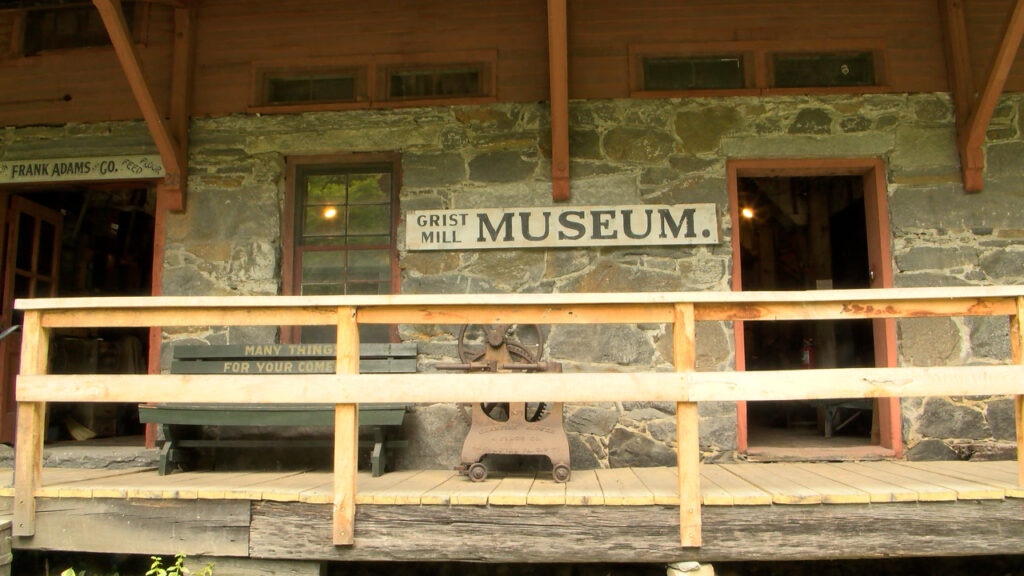“We’re in Bellows Falls,” Mike Hoey said, “Steve, as you can probably tell, a very important part of the village’s industrial history has brought us here.”
“Yes, Mike, it’s one of the few surviving relics of our industrial past,” says Steve Perkins, executive director of the Vermont Historical Society. “It really marks the ‘down the hill’ part of Bellows Falls.”
“We’re on the porch of Adams Flour Mill with historian David Deacon. What is a flour mill?”
“They crush the grain and eventually grind it into flour,” Deacon said. “We’re right on the old Bellows Falls Canal and without the canal the village wouldn’t exist. But the problem with the canal was that they didn’t make much money off it and the Atkinson family (the owners of the canal) were always in debt, so I think this was a way to give them a little more money in the 1830s and hopefully bring in some more development.”
“Was that eventually achieved?” asked Mr Hoey.
“Not immediately,” Deacon replied, “It wasn’t until the 1860s that paper mills started being built. It was the paper industry that brought wealth to Bellows Falls. The Bellows Falls Canal Company owned the mill until 1875, when they sold it to the Adams family.”
“Larry Clark, vice president of the Bellows Falls Historical Society, will be showing us around the mill,” Hoey continued. “Larry, what kind of machinery are we looking at?”
“What you’re in now is basically the old retail space,” Clark says. “This would have been part of the original building when it was first built in 1831. As David told you, we started out with water power, and then we went from a water wheel to a turbine to a second turbine and then electricity. Most of it is still there, except for the water wheel. We have the turbine in the basement.
“Back in the day, when this was basically a flour mill, you just dumped the grain in there, it was crushed and that was it. There were all kinds of elevators and hoppers going on, and even controls with clotheslines. You can see an example of that just behind you.
“We know that the mill operated from 1831 to 1961. When the last operator died, his descendants had no interest in continuing it. The benefit to us as a historical society, and to historical research in general, is that people left at that time. They left their tools behind. It’s a time capsule.”
“The people who took over the building didn’t want to see it torn down. Places like this don’t usually get preserved. When Bellows Falls was going through a revival in the mid-’60s through the ’70s, they went out and collected artifacts from other places, other factories that had closed down. A lot of that is stored here as well. There are a lot of artifacts from Vermont Farm (Machine Company) and others.”
“We’ve only just touched the tip of the iceberg,” Perkins said. “How can you find out more? How can you visit?”
“We have a website,” Clark concluded, “we have a Bellows Falls Historical Society Facebook page and we’ve now got an Adams Grist Mill Facebook page. We’re open every Saturday from Memorial Day through mid-October from 11am to 3pm and usually the same hours on Sundays as well.”


